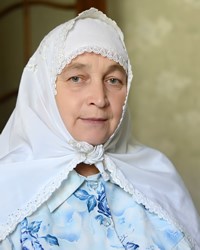Tatar in Belarus

Photo Source:
Copyrighted © 2026
Shamilini - Shutterstock All rights reserved. Used with permission |
Send Joshua Project a map of this people group.
|
| People Name: | Tatar |
| Country: | Belarus |
| 10/40 Window: | No |
| Population: | 8,000 |
| World Population: | 5,725,900 |
| Primary Language: | Tatar |
| Primary Religion: | Islam |
| Christian Adherents: | 1.50 % |
| Evangelicals: | 0.10 % |
| Scripture: | Complete Bible |
| Ministry Resources: | Yes |
| Jesus Film: | Yes |
| Audio Recordings: | Yes |
| People Cluster: | Ural-Siberian |
| Affinity Bloc: | Turkic Peoples |
| Progress Level: |
|
Introduction / History
The ancestors of the Tatars were a nomadic people living in northeastern Mongolia near Lake Baikal starting in the 5th century CE. Some of the Tatars and other Turkic peoples became part of Genghis Khan's conquering armies in the early 13th century, leading to a fusion of Mongol and Turkic peoples. These invaders of Russia and Hungary became known to Europeans as "Tatars" meaning "archer." After Genghis Khan's power eroded, Tatars were associated with the western half of the remaining Mongol domain and known as the Golden Horde. The Tatars have had a strong civilization since the tenth century. They expanded into Lithuania and Belarus 600 years ago as military men who brought their families to settle.
Although most of them live around the Volga region, others inhabit Azerbaijan, Armenia, Belarus, Ukraine, Estonia, Latvia, Lithuania, Moldova, and Central Asian republics like Kazakhstan, Kyrgyzstan, Uzbekistan, and Turkmenistan.
What Are Their Lives Like?
The Tatars in Belarus have just about lost their language in that country, so they are probably in the process of assimilating. Their rites and wedding ceremonies are becoming like to that of the Belarus majority. Tatars highly value hospitality. If someone knocks on the door of a Tatar, most likely they will not only get help, but also be invited in for tea.
Among rural Tatars the father is the legal head of the household. He is also in charge of the family income and how it is spent. The women usually cook, carry water, wash clothes, and tend to the livestock, while the men do more strenuous labor in the fields. Tatars in Belarus are noted for their ability to grow excellent tomatoes, and even their mosques usually include a tomato greenhouse in back.
What Are Their Beliefs?
Many Tatars place more of their identity in Islam than in being Tatar. Most are Hanafite, one of the four schools of Sunni Islam. While orthodox Muslims believe in Allah as the only God, many Tatars still honor saints and holy places. Some believe in supernatural powers such as the "evil eye," involving the ability to curse someone with a glance. Unlike most Muslims some of the Tatar eat pork, and very few observe the prescribed Islamic fasts. They remain more liberal than most orthodox Muslims of Central Asia, even inviting women to pray in the mosques instead of at home. Unfortunately, the Tatars' view of Christianity has been scarred by negative interactions with the Russian Orthodox Church and its earlier attempts to convert them through force. This has served to get them more dedicated to Islam and weary of any form of Christianity.
What Are Their Needs?
Christian laborers are needed to live and work among the Tatars. The Tatars are an unreached people group wherever they live.
Prayer Points
Pray for the Lord to provide an abundant grain harvest among the Tatar that will demonstrate His power and goodness.
Pray for Holy Spirit-driven workers to go to the Tatar people and begin a church planting movement.
Pray for a spiritual hunger that will drive the Tatars to the empty tomb.
Pray for a powerful Tatar church where people place their hope and identity in Christ alone.